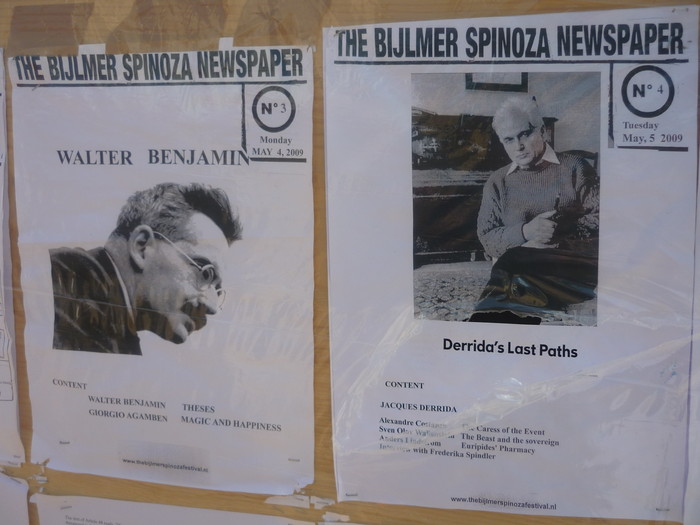THE ONTOLOGICAL DESIRE 10TH LECTURE AT THE BIJLMER SPINOZA-FESTIVAL: MAY 11, 2009 BY MARCUS STEINWEG (ABSTRACT)

THE BIJLMER SPINOZA-FESTIVAL
AN ARTWORK BY THOMAS HIRSCHHORN
http://www.thebijlmerspinozafestival.nl/_home/home.html
AN ARTWORK BY THOMAS HIRSCHHORN
http://www.thebijlmerspinozafestival.nl/_home/home.html
THE ONTOLOGICAL DESIRE
10th LECTURE AT THE BIJLMER SPINOZA-FESTIVAL: MAY 11, 2009
Notes :
PHILOSOPHICAL DESIRE OR THE DESIRE FOR PHILOSOPHY
PHILOSOPHIA: LOVE OF WISDOM. (PHILEIN, SOPHIA)
LOVE FOR THE REAL OR TRUTH OF REALITY
A PASSION FOR TRUTH OR (WITH ALAIN BADIOU): LA PASSION DU REEL, THE PASSION OF THE REAL
DYNAMICS OF THINKING IS A DYNAMICS OF DESIRE, LOVE AND PASSION
THINKING THE UNTHINKABLE, THINKING TRUTH, THINKING THE REAL IS AN ACT OF SELFACCELERATION TOWARDS THE UNKNOWABLE
ONTOLOGY, PHILOSOPHY OF BEING, ONLY EXISTS AS AFFIRMATION OF REALITY LIKE IT IS. NOT ACCEPTANCE, BUT AFFIRMATION.
LET ME GIVE 11 DEFINITIONS OF THE ONTOLOGICAL DESIRE FOR TRUTH:
1. THE ONTOLOGICAL DESIRE IS THE DESIRE FOR REALITY AS SUCH
2. THE ONTOLOGICAL DESIRE IS THE AFFIRMATION OF THE UNIVERSAL INDIFFERENCE OF THE BEING TOTALITY
3. THE ONTOLOGICAL DESIRE CAN BE DEFINED AS THE LOVE FOR THE REAL AS THEINCONSISTENCY POINT OF THE ESTABLISHED REALITY-FIELD
4. THE ONTOLOGICAL DESIRE IS A HYPERBOLIC OPENING TOWARDS THE EMPTY HEART OF THE SUBJECT AS SUCH.
5. THE ONTOLOGICAL DESIRE IS THE PASSION FOR FREEDOM
6. THE ONTOLOGICAL DESIRE IS RESISTANCE AGAINST THE POWER OF SOCIAL, ECONOMICAL, POLITICAL, CULTURAL, PHILOSOPHICAL FACTS.
7. THE ONTOLOGICAL DESIRE IS THE FIGHT FOR EQUALITY UNDER THE CONDITIONS OF ITS NON-EXISTENCE
8. THE ONTOLOGICAL DESIRE IS THE TRANSGRESSION OF THE IDEOLOGY OF PASSIVITY AND THE CYNISM OF UNFREEDOM
9. THE ONTOLOGICAL DESIRE DESIRES IMPOSSIBILITY AS SUCH
10. THE ONTOLOGICAL DESIRE IS THE BELIEF IN THE POSSIBILITY OF THE IMPOSSIBLE
11. THE ONTOLOGICAL DESIRE IS SIMPLY WHAT PHILOSOPHY IS.
______________________________________________________________
The subject of philosophy is a hyperbolic subject. It is the subject of exaggeration. I call it the subject of its ontological desire.
The exaggeration drives the subject beyond the recognized (social, political, cultural, etc.) reality. It causes the subject to collide with the official truths of certainty. The subject crosses the horizon of servitude toward something uncertain. It touches uncertainty itself. It loses the framework of the solidity of certainty. At the same time, the subject, insofar as it asserts itself as subject, must not exhaust itself in mere reaction to the solidity of facts. It is only subject when it risks transgressing the transgression of solidities itself, thus refusing to be the subject of simple resistance, of negativity and its common forms of romanticization.
The hyperbolic subject of truth is the subject of the transgression of transgression. It risks contact with truth that prevents its self-enclosure within the horizon of certainty and conscience as well as within that of critical and simply rebellious intelligence and production. It resists the plea for self-inscription in the system of recognition as well as the temptation to reflect itself in the phantasma of a pure exteriority or purity.
The hyperbolic subject exaggerates and drives itself into the conflict, the difference between recognition and exaggeration. It relates itself to that which is without relation. It authorizes itself as the site of an absolute conflict.
Philosophy and art as radical but abyssal move beyond the order of feasibility, not in any forms of assertion secured by a general principle, not in order to be more turned away from the world and reality than politics within the order of making politics, but to place the intensity of their assertion in another horizon, in an horizon of infinitude and impossibility in which the subject resists absorption by mere interests or inclinations, as Kant says. Art and philosophy are forms of self-acceleration of a desire to assert that breaks through the consensual horizons of discussion, argumentation, communication, explanation, justification or reflexive assurance of oneself. Art and philosophy only exist as this breakthrough, as the violence of transgressing the horizon, as the violence of assertion of a subject of decision, of a decision which breaks through the horizon of the possible to the dimension of the impossible which is the dimension of truth.
